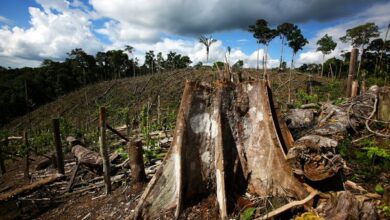
By Guest Writer
Opinion: Editor, this week on November 14, CNN reported that the climate crisis is carrying a mounting health toll that is set to put even more lives at risk without bold action to phase out planet-warming fossil fuels.
The annual Lancet countdown report from more than 100 scientists and health practitioners released on Tuesday found that delaying climate action will lead to an early fivefold increase in heat-related deaths by 2050, underscoring that the health of humans around the world is at the mercy of fossil fuels.
The UNEP report shows that the government’s plan is to produce and double fossil fuels in 2030, which would be consistent with limiting warming to 1.5°C. This has made the national climate action plans insufficient to limit the global temperature rise to 1.5 degrees Celsius and meet the goals of the Paris Agreement.
Marina Romananello’s lancet countdown the executive director and lead author told CNN that the world is moving in the opposite direction from where we should be. He added that financing going towards the fossil fuel sector and all in promotion of oil and gas burning is threatening our survival around the world. If the world continues down this fossil fuel-dependent path, Romanello stressed that the cascading consequences could be catastrophic not only for human health but also for the economy.
The analysis reveals that although the aforementioned countries’ budgets intend to promote green growth, financial institutions continue to heavily invest in risky sectors such as oil and gas (EACOP), the debt burden continues to affect the poor and vulnerable people and also threatens the destruction of critical biodiversity, among others.
It is noted that the East Africa crude oil pipeline has not only affected persons, infrastructure, displaced communities, endangered wildlife, and tipped the world closer to catastrophic climate change, but it has has caused increased temperature arising from environmental degradation, which raises concerns about potential human rights abuses like land grabbing, forced eviction, and violations. It has also eroded climate change in already poor and vulnerable oil host communities. A lot really has to be done to protect our environment from the destruction of the oil curse.
The study from the Lancet countdown report shows that the planet has already warmed roughly 1.2 degrees Celsius since the pre-industrial era in the late 1800s, and the world is 2 degrees warmer. It also shows that countries will start to see a 50% increase in exposure to extreme heat, which could lead to enormous economic losses and losses to livelihoods and wellbeing. More than half a billion more people in the world will suffer food insecurity by mid-century.
We should be mindful of what more will come out of the promotion of fossil fuels in the coming years. Our environment will not be there anymore; there will be increased negative impacts from climate change, which will lead to prolonged droughts and floods leading to food insecurity, as this has already happened in Kasenyi village in Buliisa district, where a thousand people were affected by floods caused by total energy. Additionally, Rachel Licker, a principal climate scientist, noted that managing the health risks of climate change is not a new experience for some people, but for many, it is a “wakeup call to the new realities” the world will be facing if it continues to burn more fossil fuels.
The oil and gas projects have also raised concerns about the increasing carbon emissions and environmental degradation caused by the extraction and burning of fossil fuels, which contribute significantly to climate change.
Promoting fossil fuels will contradict the goals of mitigating climate change and carry a significant financial risk, which will lead to stranded assets and financial losses for investors in fossil fuel projects like the EACOP project as the world faces an urgent need to increasingly transition to a just energy that will last for ages and provide sustainable health for people without any threats.
In my conclusion, I therefore call upon the United Nations to support a just energy transition that is clean for people, produces minimal greenhouse gas emissions, and contributes to global efforts to combat climate change that affect different development sectors, especially the agricultural sector, as it is planning to have the Climate Change Conference (COP28) in Dubai, United Arab Emirates, from November 30 to December 12, 2023.
A just energy transition is crucial because it ensures that the shift to cleaner energy sources does not leave behind marginalized communities, mitigates climate change, and releases pollutants that lead to early death, heart attacks, respiratory disorders, stroke, asthma, and degrade our environment.
The United Nations conference should encourage global cooperation and establish policies that prioritize fairness and sustainability in the just energy transition, which is a proactive step towards a sustainable, environmentally responsible future.
The author is Olive Atuhaire, AFIEGO Research Associate.
Disclaimer: As UG Reports Media LTD, we welcome any opinion from anyone if it’s constructive for the development of Uganda. All the expressions and opinions in this write-up are not those of UG Reports Media Ltd. but of the author of the article.
Would you like to share your opinion with us? Please send it to this email: theugreports@gmail.com.





